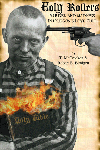Murder Without Tears
Second of Four Parts
By Stewart Holbrook
Portland Author
__
The quiet town of Corvallis
50 years ago produced a self anointed prophet who
called himself Joshua the Second. He rapidly gathered a group of fervent
followers, predominantly women. His strange antics had all
the Northwest on its ear, until finally his weakness for the ladies
brought him a violent death.
__
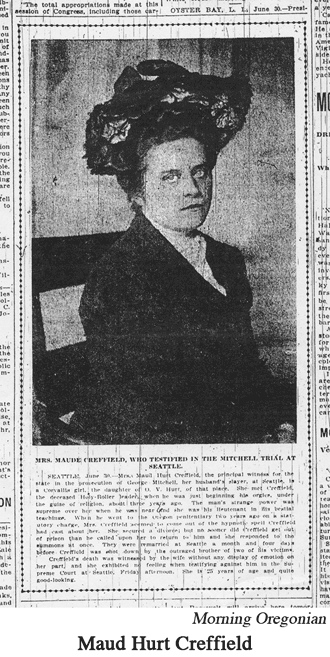 Following the
tar-and-feathers episode at Corvallis, Brother Brooks did not return to the
inhospitable town. It wasn’t to be that way with Joshua Creffield.
Following the
tar-and-feathers episode at Corvallis, Brother Brooks did not return to the
inhospitable town. It wasn’t to be that way with Joshua Creffield.
Mrs. Hunt, unknown to her
husband who had tired of the prophet, and her daughter, Maude, went looking for
the great man. They found him hiding miserably in the damp woods near the
village, still tarred, still feathered.
The women brought him to
their home, the sticky coat was removed, and a few days later Joshua dropped
his Biblical name long enough to marry Miss Maude Hunt.
The marriage proved
something of a local sensation, for it isn't often that the daughter of a
respected pioneer family wed a man who has just had tar and feathers scraped
off his hide.
But the marriage doubtless
eased the minds of many Corvallis males; they could well believe that the
prophet's search for a second Mother of Christ was done.
But the search wasn't done.
Leaving his new wife at the home of her parents in Corvallis, Joshua went to
Portland to commune with a married woman who had been a member of the sect in
the balmy days of the Kiger island colony.
She and the prophet were
presently taken in flagrante delicto by her husband, who swore out a warrant in
which he called the prophet's holy search by the hideous name of adultery.
Police had been waiting for
something tangible like this to work on.
But where was the prophet? He
seemed to have disappeared leaving no trace whatever. To stimulate the cops, O.
P. Hunt, the prophet's own father- in-law, offered a reward of $150 for his
arrest. Maude Hunt Creffield secured a divorce.
***
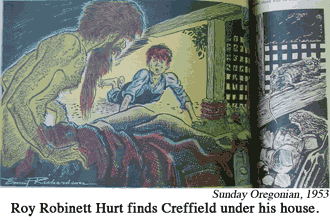 Dark clouds surely had
gathered over the career that had begun so famously on Kiger island.
Dark clouds surely had
gathered over the career that had begun so famously on Kiger island.
Nearly three months thus
passed with the prophet supposedly at large. Then, one day in June, young Roy,
adopted son of O. P. Hunt, made a startling discovery.
Crawling under the Hunt home
in search of a tin can to carry worms on a fishing trip, the youngster was
frightened near out of his wits when he suddenly found himself looking into the
great, dark, yet blazing eyes of a bearded man.
Backing out of the hole as
fast as he could, the lad ran screaming bloody murder to his foster father. Mr.
Hunt came and peered into the hole, then called police.
The cops came and hauled the
prophet from his den under the house. He was, as one of the officers remarked in
my hearing thirty years after, a sight to behold.
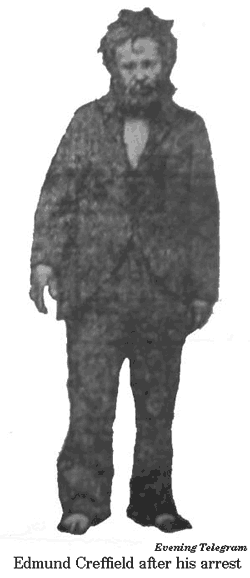 Naked as to clothes, and
dirty as a could be imagined, the prophet was hairy all over as a water
spaniel, and most wonderfully endowed by Mother Nature withal.
Naked as to clothes, and
dirty as a could be imagined, the prophet was hairy all over as a water
spaniel, and most wonderfully endowed by Mother Nature withal.
His beard grew down over his
stomach and was like unto a clump of young alder. He was weak, too, and could
scarcely stand.
"You're Creffield,
ain't you?" asked a doubtful cop, no doubt recalling folk tales of
surviving troglodytes from prehistoric times.
"I am Joshua." The
voice that came from the long beard was weak, yet it was obviously the voice of
a prophet.
It was a weird tale that the
officers and the astonished Mr. Hunt pieced together. For more than two months
the prophet had lived day and night in under the home of his ex-father-in-law,
unsuspected by the menfolk of the house.
He had existed on jars of
fruit and scraps of food that Mrs. Hunt and other faithful (who were admitted
to the secret) could smuggle to him.
It was unseemly in a prophet
to do so, but he complained that the provender had been neither sufficient nor
of very high quality. But then, it had always been thus with true prophets.
The only bed covering Joshua
had when removed from his den was a ragged and filthy quilt.
***
Creffield was taken to
Portland and put on trial before Judge Sears’ court in Multnomah county.
He readily admitted what the
court charged were improper relations with the former Corvallis matron, but he
said that such things were not at all improper in a man of God such as he.
"Christ," said he in the manner of so many mountebanks, "broke
the Sabbath day and the Jews put Him to death. I've broken your laws, and you
will undoubtedly do the same to me. Like Christ, however, I will rise again and
ye all shall suffer."
The jury was fortunately made
up of forthright men. In less than 12 minutes they brought in a verdict of
guilty.
Judge Sears asked Creffield
if he had anything to say before sentence was given. He did. He had a lot to
say.
In a rambling yet fervid
harangue, during which he misquoted considerable Scripture and called the
saints to witness, he told the court and the jury that he forgave them, for
they knew not what they did.
"Two years in state's
prison," said Judge Sears, a man of few words.
"God bless you,"
replied the prophet, and impious deputies laid hands on him and whisked him
away to Salem.
He was shorn of his glorious
beard and hair, and dressed in at the pen as Number 4941, on September 16,
1904.
Theodore Roosevelt was in
the White House, Russia and Japan were at war. Good beef
steak was 15 cents a pound. Sweet Caporal cigarets (sic) were 5 cents for a package of ten. Erickson’s saloon in Portland
delivered ten ounces of beer for a nickel. “Meet Me in St. Louis, Louis” was
the song hit of the year.
Fifteen months after his
incarceration the prophet was released. The warden, of course, couldn't know
what a baggage of trouble and tragedy he was turning loose.
Now, with his beard gone,
his hair cut close, Joshua left the scene of his triumphs and trials, and went to
Los Angeles, then as now a lodestone for prophets of all kinds. He did not stay
long, but was soon in San Francisco.
How he lived during this
period of exile was never clear, but one should consider that no prophet has
ever starved in California.
It wasn’t long before people
in Corvallis learned that Joshua was writing letters to 17-year-old Esther
Mitchell, she who had help raised (sic) the temple wigwam on Kiger island. He wrote her that God had made it clear to him--that
Esther and no other was to become the second Mother of a Second Messiah.
What young Esther replied is
not known, but events that were soon to pile up would indicate she was
favorable.
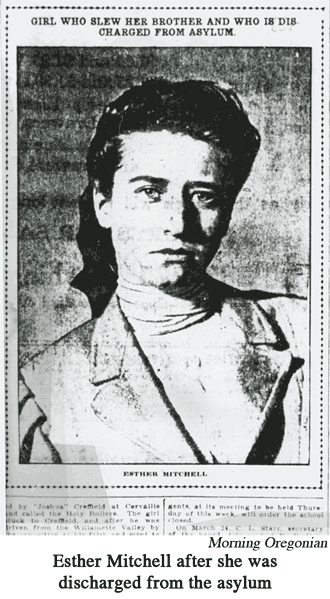 The prophet was also getting
tough. From San Francisco to Mr. Hunt, his former father-in-law at Corvallis,
as follows:
The prophet was also getting
tough. From San Francisco to Mr. Hunt, his former father-in-law at Corvallis,
as follows:
“God has resurrected me. I
have now got my foot on your neck. God has restored me to my own. I will return
to Oregon and gather together all of my followers. Place no obstruction in my
way, or God will smite you. (Signed) Joshua II.”
***
That was clear enough,
surely. And from San Francisco, too, the prophet wrote his
ex-wife, Maude Hunt, then living in Seattle with a brother and a sister-in-law,
Mr. and Mrs. Frank Hunt, asking Maude if she would remarry him. Maude
replied that she would if Joshua if he would come to the Puget Sound city.
The prophet,
now in full beard again and ready for anything, came north, stopping
neither at Corvallis nor in Oregon, but going direct to Seattle. He and Maude were married by an orthodox minister.
And now Joshua the Second
made plans for a triumphant return to the state that had seen his first
successes, but had in the end treated him shabbily indeed.
He would, he vowed, go to a
primeval spot that he knew on the Oregon coast and there establish a New Zion,
a marvelous colony for the faithful.
It was, he added, to be a
true Garden of Eden in which the flock could live in a manner best suited to
them and their beliefs, free from the profane gaze of scoffers.
It would take a little cash,
obviously, to purchase this Eden, which he had visited, and he suggested that
Mr. and Mrs. Frank Hunt dispose of their Seattle property and buy the land for
the glory of God.
So hypnotic was this bearded
man with the startling eyes that the Hunts did just that. They sold their
Seattle home and bought the strip of land favored by Joshua. It was south of
Waldport, fronting the Pacific, and was then, in 1906, a very remote place.
The plan was for the two
Hunts and Maude were to go to the place as an advance party. Joshua would in
the meantime sound the call to the faithful, telling them that they could
remain away from Eden only at their own peril.
"Peril?" asked
Frank Hunt, who was not yet fully apprised of the powers of a genuine prophet
who was working a Full Gospel franchise.
"Peril, YES!" cried
the prophet, and added, "Brother Hunt, I am about to call down the wrath
of an angry God on these modern Sodoms of Seattle, of Portland, of San
Francisco, and Los Angeles. Yea, and of Corvallis.
“But have no fear, Brother
Hunt. My faithful will return to the fold--all of them. They will leave all
behind them their scoffing fathers, their brothers, their husbands, and they
will journey to our Eden."
***
And thereupon Joshua let go
an awful curse: "A curse, O God, on San Francisco, on Portland, on
Corvallis, on Seattle."
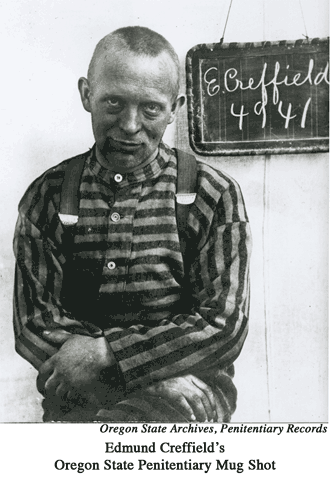 This tremendous curse was
loosed on the morning of April 17, 1906, just as the Eden advance party got
aboard a train at Seattle on the way to Newport, nearest railroad station to
the Garden.
This tremendous curse was
loosed on the morning of April 17, 1906, just as the Eden advance party got
aboard a train at Seattle on the way to Newport, nearest railroad station to
the Garden.
Next day, the 18th, Joshua
again laid foot on Oregon soil. He avoided Corvallis, where he would have had
to change cars, by getting off the train at Airlie and being taken in a
livery-stable rig to Wren, 12 miles west of Corvallis, where he could board the
train for Newport.
I like to contemplate Joshua
the Second in the hamlets of Airlie and Wren. What did the station agent at
Airlie think of the bearded fellow who got off the cars and into the waiting
buggy? What did the conductor think was getting aboard when the flag went up at Wren.
Did Joshua do anything to
reveal his identity? And if so, what did the conductor and the station agent
think when they picked up their newspapers on that fateful day? The headlines
on every front page in the United State, and much of the rest of the world,
said that the great city of San Francisco had trembled early that morning, its
mighty buildings had heeled drunkenly, then tumbled headlong into rubble, while
the tortured gas mains exploded and flames roared high over the enormous
disaster of a metropolis destroyed.
When the little train rolled
on carrying the prophet through Blodgett and Devitt and Eddyville , on the way to Newport and the Garden
of Eden, San Francisco was a holocaust and mariners a hundred miles from the
Golden Gate were navigating in smoke.
Continued next Sunday
Chapter of Holy Rollers where these articles are some of the sources:
The Prologue
Stewart Holbrook's Murder Without Tears, Part One
Stewart Holbrook's Murder Without Tears, Part Two
Stewart Holbrook's Murder Without Tears, Part Three
Stewart Holbrook's Murder Without Tears, Part Four
51Startling Detective Magazine, Nemesis of the Nudist High Priest
***
Newspaper Articles about Creffield & the Holy Rollers
1897-1903: B.C. (Before Creffield)
October to December 1903:Holy Rollers Burn Furniture & Pets
January to March, 1904: Holy Rollers Tarred and Feathered
April to June 1904: Holy Rollers are Committed to the Asylum
July 1904: Creffield is Found & Arrested
September 1904: Creffield's Trial
April 1906: Men are Gunning For Creffield
May 1906: Creffield is Murdered, Murderer is Considered a Hero
May 1906: Holy Rollers Found Starving Near Heceta Head
June 1906: George Mitchell's Trial Begins
July 1906: Hurt Testifies of Debauched Wife and Debased Sisters
July 1906: Esther Mitchell Kills Her Brother
August to October 1906: Seattle Prepares for another Big Trial
November 1906: Maud Hurt Creffield Commits Suicide
April 1909-August 1914: Esther Leaves the Asylum
1953 Stewart Holbrook's Murder Without Tears
1951Startling Detective Magazine, Nemesis of the Nudist High Priest
***
Chapters from
Holy Rollers: Murder & Madness in Oregon's Love Cult
Part 1: The Seduction
Chapter 1: Trust Me, Brothers And Sisters
(Life Before Creffield [B.C.])
Chapter 2: God, Save Us From Compromising Preachers
(Creffield's Preachings)
Chapter 3: The Flock
(Profiles of the Holy Rollers Were)
Chapter 4: The Holy Rollers
(Things Start to Get Wild on on Kiger Island)
Chapter 5: Housecleaning
(There's a Sacrificial Bonfire)
Chapter 6: Community Concerns
(Officers Visit)
Chapter 7: Esther, The Chosen One
(Creffield Plans to Marry 16-Year- Old)
Chapter 8: Tar and Feathers
(The Men of Corvallis Act)
Chapter 9: Sane People Don’t Go Bareheaded
(Holy Rollers are Committed to the Asylum)
Chapter 10: More Beast Than Man
( Creffield is Arrested)
Chapter 11: God Will Plead Creffield's Case
(Creffield in Court)
Chapter 12: Scandal
(Shocking Testimony at the Trial)
Chapter 13: Calm Before the Storm
(The Holy Rollers Resume their Lives)
Chapter 14: Giving Up The Ghost
(Men are Gunning for Creffield)
Part Two: The People V. Creffield
Chapter 16: The Widow Creffield
Chapter 19: An Inherited Streak of Insanity
Part Three: The Madness
Chapter 23: Seeking Reconciliation
Chapter 24: Another Holy Roller Page One Murder
Chapter 25: What Can Papa Do For You?
Chapter 26: Human Life is Too Cheap In This Community
Chapter 30: The Final Chapter
(What Happened to Everyone Afterwards)
The Epilogue
(Heaven's Gate)
